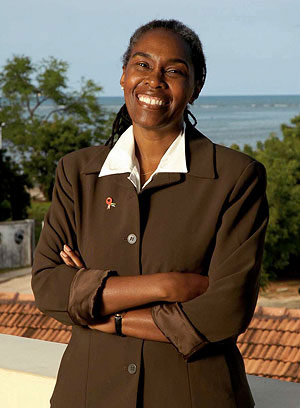 |
 [an error occurred while processing this directive]
[an error occurred while processing this directive]
[an error occurred while processing this directive]
[an error occurred while processing this directive]
|
 |
|
 |

Spring 2005: 40 Years
paul joynson-hicks
Cheryl Scott
Country Director, Centers for Disease Control and Prevention, Tanzania
B.A. Biology, Oakes College, 1974
Tourists come from around the world to witness the wonders of Serengeti National Park in Tanzania, but Dr. Cheryl Scott has never been able to slip off with friends or family to see the wildebeests and cheetahs herself. Her job running the Centers for Disease Control and Prevention (CDC) office in the East African nation of about 34 million people—where an estimated 10 percent of the population has HIV—leaves little time for sightseeing.
Since the Global AIDS Program Office was founded in 2001 with a small staff at the invitation of the Tanzanian government, the CDC’s contribution to the fight against HIV/AIDS in that country has grown “exponentially,” Scott says. Under her leadership, CDC–Tanzania has supported improving blood-transfusion safety, strengthening laboratory services, developing a national HIV/AIDS surveillance system, and preventing mother-to-child HIV transmission. With recent funding from President Bush’s Emergency Plan for AIDS Relief, her office now manages a $17 million budget.
Working closely with the Tanzanian government, the CDC and other U.S. government partners are providing technical support to the rollout of a national antiretroviral drug therapy program—which can turn HIV into a manageable condition instead of a death sentence. Over the next five years, the government plans to put 400,000 people on the drugs in a nation where roads are frequently impassable and communications are sporadic.
“Tanzania is a large and populous country, and care and treatment present tremendous logistical challenges,” Scott says. Developing a reliable laboratory system, planning large-scale counseling and testing, and training practitioners to work with clients on often-complicated drug regimens are just a few of the challenges she and her staff regularly face.
The introduction of antiretroviral drugs will complement an effort begun in 2003 providing life-saving medicines for expectant mothers. The single-dose treatment can cut infection rates of newborns by up to 80 percent.
Battling HIV/AIDS in Tanzania is the latest step in an international career that has taken Scott to the Ivory Coast, Kenya, India, and the Caribbean. An investigator in the elite Epidemic Intelligence Service at the CDC, Scott has also worked in maternal and child health and disaster epidemiology in California, New York, and New Jersey, where she was the state’s maternal and child health epidemiologist.
In Africa, Scott’s challenges are not all medical. Her job also has a diplomatic side, involving frequent consultation with the U.S. embassy and the Tanzanian government. While mobilizing the host government’s support for the fight against HIV/AIDS in several countries has been politically difficult, “it is a privilege to partner with the Tanzanian government,” she says. “They are very clear about their situation and what assistance is needed.”
Despite the long hours and travel schedule that takes her around the continent, Scott enjoys her time in Tanzania. Her public health physician husband, Stephen S. Robinson, works with the National Institute for Medical Research, and their 9-year-old daughter, Ajayi Omiseye, attends a local elementary school. “She gets a lot out of being here,” Scott said, noting that her husband and daughter have become more fluent in Kiswahili than she has. “It’s a rewarding life.”
—Louise Gilmore Donahue
---
PDF Version
|





